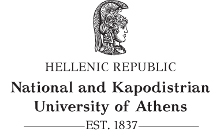School of Economics and Political Sciences
Department of Political Science and Public Administration
GEORGIOS SOLOMONIDIS
Doctoral Dissertation in progress
«Subject, Desire and History: Deleuze and Lacan»
Commencement date: January 16, 2024
Abstract
The dissertation takes as a starting point the Marxist notion of "abstraction in action" with respect to the function of capital in the capitalist mode of production. That is, the explanation of how social formations are articulated via abstractions that simultaneously set and are set in motion by historically concrete social relations. Following this conceptual precedent, Deleuze's endeavor (in combination with his collaboration with Guattari) will be articulated as a negotiation of the above utilizing his philosophy of difference, which constitutes the theoretical edifice of his approach. The scope is to highlight that his project aims, among other things, at the ontological reconciliation within a unified theory: of the economy (of material social relations), the subject and the social (as a symbolic network), establishing an immanent field of desiring production. Thus, a unified theoretical conception of the social will be formed, based on the axes of the subject, of history and desire. These concepts will be studied and elaborated within the framework of the Deleuzian philosophy of difference. Subsequently, desire -crystallized as desiring production- will be shown to be the immanently emerging driving force that constitutes the social in general.
While the Deleuzian project sets the framework of objectives that are necessary for conceiving the social as an immanent/unified field , it will ultimately be shown to "short-circuit" due to its contradictory ontological foundation. The purpose of the dissertation is to investigate the extent to which the Deleuzian philosophy of difference, which constitutes the ontological basis of the Deleuzian approach to the social, is articulated as a critique of the Lacanian/psychoanalytic approach and to; subsequently, demonstrate the manner in which it fails both as a theory and as a critique, due to its misreading of the Lacanian oeuvre. At the same time, through the study of Lacanian psychoanalysis, it will be shown that while Lacan's theory forms an ontologically consistent approach to the social, it lacks the set of intentions that will be shown to be integral to the formation of a unified (in its discontinuity) conception of the social phenomenon. Consequently, the dissertation will take the form of an immanent critical juxtaposition of the Deleuzian with the Lacanian approach. By combining the set of objectives constitutive of the Deleuzian project with the ontological grounding provided by the Lacanian approach, this comparative synthesis aims to formulate a coherent theory of the social. The said theory will aim to structurally and immanently articulate, on the basis of desire, the relation between the subject and material reality, which (relation) will be historically grounded, accompanied by the simultaneous conceptualization of each term.
